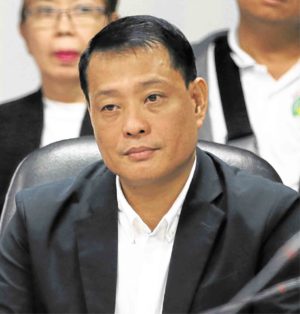Senate blue ribbon committee eyes probe of ‘tara’ system in NFA
The Senate blue ribbon committee is inclined to investigate allegations of a “tara” (payola) system in the National Food Authority (NFA) and a supposed scheme to favor private traders as claimed by Sen. Risa Hontiveros, Sen. Richard Gordon said on Tuesday.
Gordon, the committee chair, said the panel would “most probably” look into the allegations.
Sen. Cynthia Villar, the Senate agriculture committee chair, said those accusing NFA Administrator Jason Aquino should file cases against him.
President Rodrigo Duterte earlier agreed to let go of Aquino amid NFA rice supply problems, which pushed up prices of the staple.
Presidential spokesperson Harry Roque wants Aquino to be made accountable for the shortage of NFA rice, and is even willing to file the cases if nobody else will.
“If nobody will file, I’ll file graft and corruption. I will file lots more. And technical malv-ersation is a small case. I want a case with a longer prison time,” Roque said at a press briefing on Tuesday.
He added: “Because he did not spend the money allocated for buying from local farmers in order to build our buffer stock, we are forced to import and pay foreign farmers.”
Roque said some importers were also preparing to file cases against Aquino.
On Monday, Hontiveros delivered a privilege speech accusing Aquino of involvement in a corruption scheme in the NFA involving the tara system.
P100 per bag
At a rate of P100 per bag of rice, the money made from the scheme would amount to P2 billion, as the country was importing 20 million bags in a year.
She said the NFA had manipulated its buffer stock by bringing down the supply so that the price of rice from private traders would go up.
The NFA also delayed the entry of G2G (government-to-government) rice to give advantage to private traders, who would be able to sell their stock at a high price, she said.
Rice cartels
The NFA was also involved in allowing rice cartels to control stocks of imported rice through the use of front cooperatives and farmers association, Hontiveros further said.
The money is made through the Minimum Access Volume (MAV) Program, which is how the private sector imports rice, and through the G2G or government-to-private (G2P) program, which is how the government imports rice for the NFA buffer stock, she said.
“In both these pathways, corruption is endemic,” Hontiveros said.
“How much was paid to Jason Aquino by private importers for allowing this modus operandi? We can only surmise. What criminal offense can be charged against him? Here, there is no surmising. Economic sabotage under Republic Act No. 10845,” she added.
Aside from the tara, the NFA also imposed service fees under Aquino, she said.
“In short, we are looking at a multibillion-peso enterprise. A multibillion enterprise that has lined the pockets of a privileged few, and caused hunger to untold numbers of Filipinos,” Hontiveros said.
She said the NFA under Aquino had not followed the MAV application process when it came to some cooperatives.
Aquino, she said, extended import permits covering 5,380 metric tons in 2016 for three importers. But this was after he had squabbled with another official because he refused to extend the import permits from February to March, Hontiveros said.
She also said Aquino had favored beneficiaries who never submitted letters of intent.
‘Rehashed’ accusations
NFA spokesperson Rex Estoperez said the claims of corruption disclosed by Hontiveros were “rehashed” accusations that the NFA had explained “several times before.”
“What’s absurd about that is that they were saying we delayed the unloading of the rice shipments to favor private importers. But can we instruct the weather?” Estoperez added.
While some said that it was old news that cooperatives were being used as fronts of rice importers, Hontiveros said she still had to speak up about it.
“But if we see patterns, Mr. President, if we see repetitions of past anomalies, we have a duty to call this out. It is part of the process of finding long-term solutions,” she said.
Inspectors removed
As for the government-imported rice, Hontiveros said that when the 2017 G2P imported rice began to arrive, Aquino removed NFA personnel at the ports where the foreign vessels were unloading rice.
The NFA also canceled the regular preoperation meeting that was supposed to plan the delivery and distribution of the rice, she said. “It’s as if Jason Aquino has a gag order on the employees of the NFA.”
The NFA, she said, took a month to issue the memorandum of undertaking for huge shipments of rice that arrived from September to October in 2017, and allowed the imported rice to sit at the anchorage area for a month.
Aquino — who is set to be replaced by Army chief Lt. Gen. Rolando Bautista — is also embroiled in a graft case for using NFA funds to pay for its loans instead of stabilizing the supply and prices of grains. —With a report from Karl Ocampo
